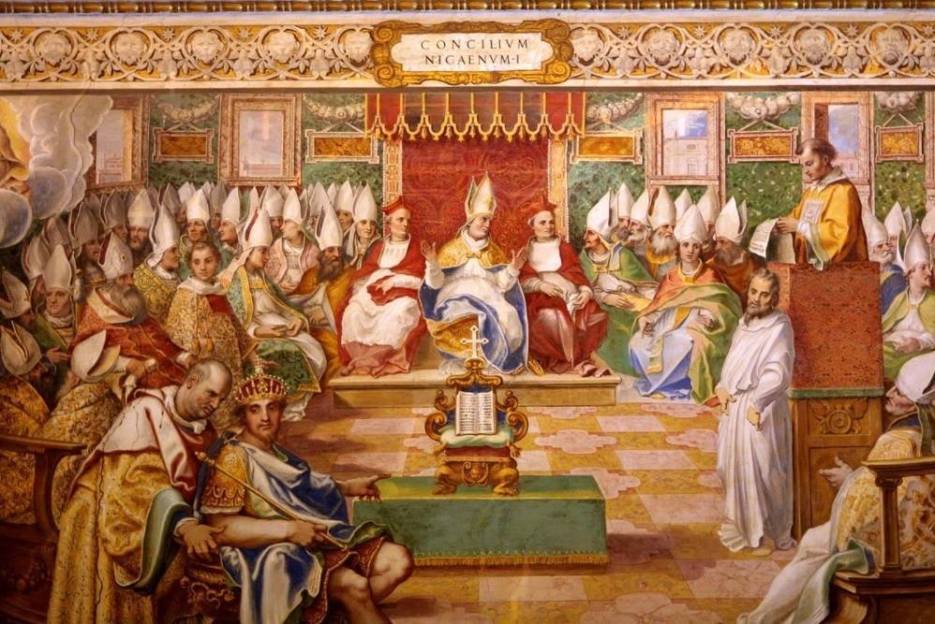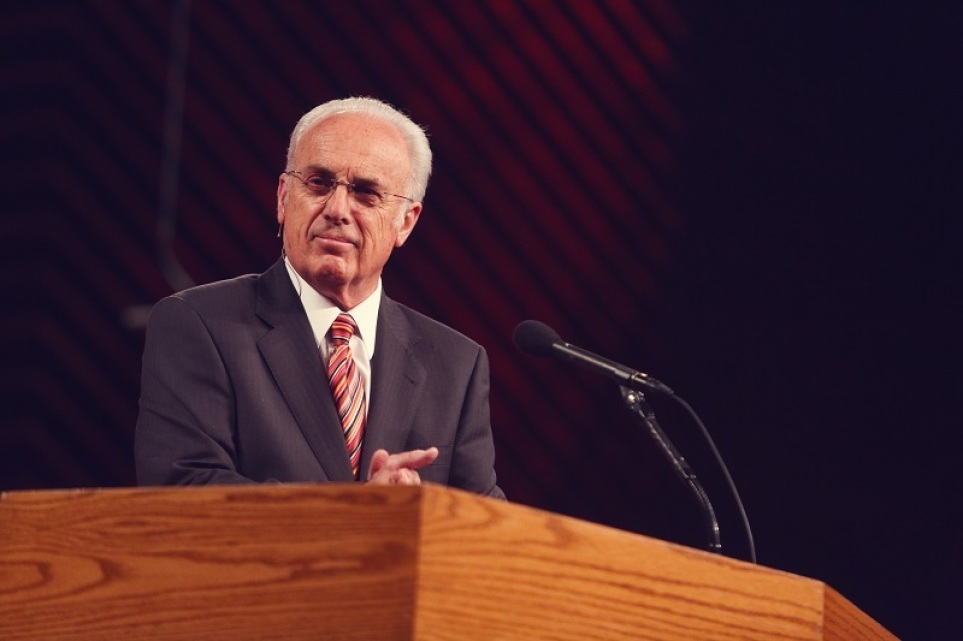Teólogos refutan conceptos erróneos sobre el Credo de Nicea, de 1700 años de antigüedad

Dos teólogos han refutado ideas erróneas sobre el Credo de Nicea y el Concilio del 325 que lo creó, mientras muchas iglesias celebran el 1.700° aniversario de éste influyente documento.
En un episodio reciente del podcast "The Table" del Seminario Teológico de Dallas, Malcolm B Yarnell III, profesor de investigación de teología sistemática en el Seminario Teológico Bautista del Suroeste en Fort Worth, Texas y Michael J. Svigel, profesor de teología histórica y sistemática de DTS, discutieron los orígenes del Credo de Nicea y su impacto en la sociedad moderna.
[Estamos en WhatsApp. Empieza a seguirnos ahora]
Yarnell explicó que aunque era "el credo más universalmente aceptado" en el cristianismo, "ha sido desafiado en varios puntos a través de la historia cristiana".
En tiempos modernos, Yarnell señaló ejemplos de la Iglesia de Jesucristo de los Santos de los Últimos Días y los Testigos de Jehová como grupos que rechazan elementos clave del Credo de Nicea, específicamente la doctrina de la Trinidad. Ambos grupos afirman ser cristianos pero son incompatibles con el cristianismo bíblico.
Svigel advirtió que "incluso en lo que se considerarían círculos cristianos conservadores", uno puede encontrar maestros que están "reconstruyendo la historia de la Iglesia de una manera bastante descuidada".
Por ejemplo, Svigel criticó la afirmación de que, antes del Concilio de Nicea del 325, la iglesia primitiva "no era realmente trinitaria", contraargumentando que, en realidad, el credo estaba "articulando en lenguaje preciso lo que la Iglesia ha estado enseñando explícitamente".
"The Father is God, the Son is God, the Spirit is God. The Father's not the Son, the Son's not the Spirit, the Spirit's not the Father. There's one God, not three Gods. The Church has consistently been teaching that," he stated.
"El Padre es Dios, el Hijo es Dios, el Espíritu es Dios. El Padre no es el Hijo, el Hijo no es el Espíritu, el Espíritu no es el Padre. Hay un Dios, no tres Dioses. La Iglesia ha estado enseñando eso consistentemente", declaró.
"Sometimes this sloppy thinking, even among Christians who think, 'well, the Church became Trinitarian, and therefore if the first three centuries weren't Trinitarian, then maybe it's optional.' ... They don't take it as seriously. ... The role of the creed was not to establish something new. That's not what it did."
"A veces este pensamiento descuidado, incluso entre cristianos que piensan, 'bueno, la Iglesia se volvió trinitaria, y por lo tanto si los primeros tres siglos no eran trinitarios, entonces tal vez es opcional'. ... No lo toman tan en serio. ... El papel del credo no era establecer algo nuevo. Eso no es lo que hizo".
Yarnell took issue with the claim among some that the Nicene Creed is a "Western imposition" on other parts of the world, noting that the Council of Nicaea was mostly non-Western European.
Yarnell cuestionó la afirmación entre algunos de que el Credo de Nicea es una "imposición occidental" en otras partes del mundo, señalando que el Concilio de Nicea era principalmente no-europeo occidental.
"The bishops at both the Nicene council of 325 and the Council of Constantinople of 381 are primarily Eastern. There were Western representatives, but they're primarily Eastern bishops," Yarnell explained.
"Los obispos tanto en el concilio de Nicea de 325 como en el Concilio de Constantinopla de 381 son principalmente orientales. Hubo representantes occidentales, pero son principalmente obispos orientales", explicó Yarnell.
"Moreover, the leading theologians of the early church, both with regard to Trinity and Christology, which became a major conversation in the fifth century, are Africans."
"Además, los principales teólogos de la iglesia primitiva, tanto con respecto a la Trinidad como a la Cristología, que se convirtió en una conversación importante en el siglo quinto, son africanos".
While considered an ecumenical Creed, many churches, especially Protestant and Evangelical nondenominational congregations, do not recite the Nicene Creed as part of worship.
Aunque se considera un Credo ecuménico, muchas iglesias, especialmente las congregaciones protestantes y evangélicas no denominacionales, no recitan el Credo de Nicea como parte del culto.
For example, recent efforts within the Southern Baptist Convention to add the Nicene Creed to the 2000 Baptist Faith & Message have not been successful, due to various reasons.
Por ejemplo, los esfuerzos recientes dentro de la Convención Bautista del Sur para agregar el Credo de Nicea a la Fe y Mensaje Bautista de 2000 no han sido exitosos, debido a varias razones.
Svigel argued that creeds like the Nicaean one can help "balance the Christian faith and also balance our reading of Scripture," while Yarnell believes they can help guide a new believer who is starting to read the Bible.
Svigel argumentó que credos como el de Nicea pueden ayudar a "equilibrar la fe cristiana y también equilibrar nuestra lectura de la Escritura", mientras que Yarnell cree que pueden ayudar a guiar a un nuevo creyente que está comenzando a leer la Biblia.
"When somebody comes to start reading the Bible and they start importing all sorts of ideas, especially from their own contemporary culture and determining, 'that's what the Bible means,' when actually the Bible's not even talking about that. Or they take an issue that is a narratival issue, and they become so wrapped up in that that they forget what is the core message of Scripture," Yarnell explained.
"Cuando alguien viene a comenzar a leer la Biblia y comienzan a importar todo tipo de ideas, especialmente de su propia cultura contemporánea y determinando, 'eso es lo que significa la Biblia', cuando en realidad la Biblia ni siquiera está hablando de eso. O toman un tema que es un asunto narrativo, y se envuelven tanto en eso que olvidan cuál es el mensaje central de la Escritura", explicó Yarnell.
"So, I think Svigel's right, they have a hermeneutical guiding function to let you know this is the main road. And it also helps you avoid the errors of falling off into the ditches as well, into extremes, into things that are not really part of the faith."
"Entonces, creo que Svigel tiene razón, tienen una función hermenéutica guía para hacerte saber que este es el camino principal. Y también te ayuda a evitar los errores de caer en las zanjas también, en extremos, en cosas que realmente no son parte de la fe".
Yarnell also noted that, for his classes, he advises his students "to memorize one of the creeds, especially either the Apostles' Creed or the Nicene Creed, as they prepare to teach and to preach."
Yarnell también señaló que, para sus clases, aconseja a sus estudiantes "memorizar uno de los credos, especialmente ya sea el Credo de los Apóstoles o el Credo de Nicea, mientras se preparan para enseñar y predicar".
"I really believe that the creeds help us to identify and remember the central teaching of the biblical text, the apostolic preaching, the preaching of the Gospel of salvation," he added.
"Realmente creo que los credos nos ayudan a identificar y recordar la enseñanza central del texto bíblico, la predicación apostólica, la predicación del Evangelio de salvación", agregó.
The podcast episode comes as churches across the world celebrate 1,700 years since the First Council of Nicaea met in modern-day Turkey and crafted the Nicene Creed.
El episodio del podcast llega mientras las iglesias alrededor del mundo celebran 1,700 años desde que el Primer Concilio de Nicea se reunió en la actual Turquía y elaboró el Credo de Nicea.
Called by Emperor Constantine the Great and held shortly after the Roman Empire had legalized Christianity, the fourth century gathering came in response to the rise of Arianism, an early church heresy that claimed that Jesus Christ was created by God, rather than being coeternal.
Convocado por el Emperador Constantino el Grande y celebrado poco después de que el Imperio Romano hubiera legalizado el cristianismo, la reunión del siglo cuarto vino en respuesta al surgimiento del arrianismo, una herejía de la iglesia primitiva que afirmaba que Jesucristo fue creado por Dios, en lugar de ser coeterno.
The Nicene Creed reaffirmed the orthodox belief that Jesus was "God from God, Light from Light, true God from true God, begotten, not made, consubstantial with the Father."
El Credo de Nicea reafirmó la creencia ortodoxa de que Jesús era "Dios de Dios, Luz de Luz, Dios verdadero de Dios verdadero, engendrado, no hecho, consubstancial con el Padre".
In April, the Roman Catholic Church's International Theological Commission released an official document highlighting the significance of the council and the creed, and providing resources on the topic.
En abril, la Comisión Teológica Internacional de la Iglesia Católica Romana publicó un documento oficial destacando la importancia del concilio y el credo, y proporcionando recursos sobre el tema.
"The faith that the Council of Nicaea witnesses to and hands on is the truth of a God who, being Love, is Trinity, and who, out of love, becomes one of us in his Son," stated the ITC in a press release.
"La fe de la que el Concilio de Nicea da testimonio y transmite es la verdad de un Dios que, siendo Amor, es Trinidad, y que, por amor, se hace uno de nosotros en su Hijo", declaró la ITC en un comunicado de prensa.
"The Nicene Creed thus stands at the heart of the [Catholic] Church's faith as a wellspring of living water to be drawn upon also today. Through it, we can enter into Jesus' gaze and, in him, into the gaze with which God, Abba, looks upon all his children and upon the whole of creation, starting with the least, the poor and the outcast."
"El Credo de Nicea así permanece en el corazón de la fe de la Iglesia [Católica] como una fuente de agua viva de la cual beber también hoy. A través de él, podemos entrar en la mirada de Jesús y, en él, en la mirada con la cual Dios, Abba, mira a todos sus hijos y a toda la creación, comenzando con los más pequeños, los pobres y los marginados".


















